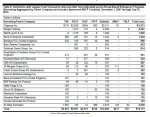=Conservative;1059782249]No one is condoning the amount "Bush" Spent but Bush never ran trillion dollar deficits and Bush had 9/11 which GAO puts the cost at over a trillion dollars in direct and indirect costs. I wasn't happy with Bush but faced with the alternative of Gore or Kerry, I chose wisely. Today I will never support sending more money to the Federal Govt. politicians that created this 14.6 trillion dollar debt. why reward bad behavior. It is time to cut Federal Spending and stimulate the private sector to grow our way out of this debt. Not going to happen by just slowing the growth of spending.
Okay, I understand what you are saying to a degree, but again, like Clinton or hate him, we had a good economy under him, and I'm not saying he did anything to influence that, but he didn't get in the way either. I'm only pointing this out to show that the tax rates in place at the time, didn't stop the growth of business, now certainly you can agree with that ?
Again, I agree I didn't like Gore or Kerry either. That has nothing to do with what was done. I agreed the tax cuts of 2003 were need to help jump start the economy, but knowing the war was going to be costly, IMO it was very short sighted of him to wait until 2010 to have them expire. 3 years should have been ample time, (and in fact was) to get our economy back on track. Raising those taxes back up would have been the prudent thing to do to help pay for the war, That tax increase could well have been set up to sunset out in five years or whatever time was deemed needed to finish what we started.
I am willing to send nothing more to the govt. until they get serious about debt reduction and that isn't going to happen by massive expansion of the Federal reach on things like Obamacare and other social engineering programs. That is the responsibility of the states not the Federal Govt. I am one of those conservatives that believe we have a spending problem not a revenue problem. In addition to the 47% of income earners that don't pay any FIT, we have 25 million unemployed and under employed Americans that aren't paying much either. Instead of creating an atmosphere that promotes job growth this govt. is destroying jobs
You're not alone, I have said we have a spending problem until I'm blue in the face, and I thought that is what I was saying is that I want to see real honest to goodness cuts before giving them any more money to spend... until I see that from them. Yes if their was ever a balanced budget Amendment put in place, then I would be all for an immediate tax hike, that could only be used to pay on the principle of our debt and nothing else.
Totally agree, we need a flat tax so that everyone pays something. Think of what $100 a year would generate from those 47% of the 140 million American workers that aren't paying any FIT? I want to see a govt. down to the 1.6 trillion dollar range and ould start by taking SS and Medicare off budget immediately. I then would bill every foreign country or deduct it from their foreign aid for illegals from their countries using our ER's. The only way I would support a tax increase is with a balanced budget amendment and then taking the existing debt and pay it off with a debt tax in the form of a Federal Sales Tax. The balanced budget amendment would have to be enforceable though.
Now as for those 47% that pay nothing in federal income tax, you and I are in complete agreement on this, each and every one of them should pay something even if only 2 or 3 dollars a week, everyone needs to pay for the privilege of living here, everyone. I was only pointing out that the Bush tax cuts, increased the number of people paying nothing.
Come on, you can't take SS and Medicare off the table immediately, that's just telling people that have paid in for the last 20, 30 or more years that they just got hammered with a huge tax increase.
SS is easily fixed, by simply ending early retirement now, and adding one more year of working for those that are 55, and two more years for those that are 45, and 3 more years for those that are 35 The only possible way to end SS would be to pay back every person the full amount plus a nominal interest rate of what they have paid in.

